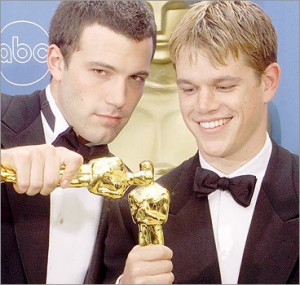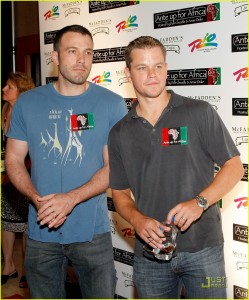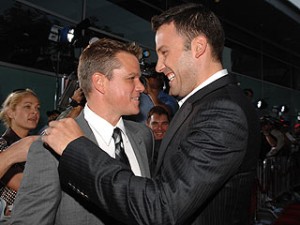

By Noah Forrest Forrest@moviecitynews.com
Damon & Affleck: Two Roads to Stardom
While I was watching the middling, but not altogether unenjoyable The Adjustment Bureau, I was struck but how many other films it reminded me of. Dark City, for sure. A little bit of The Matrix, no doubt. A big dose of The Lost Room, absolutely. But the film I was most reminded of while watching it was John Woo’s 2003 film Paycheck, starring Ben Affleck. I remember it was around that time when I realized that Matt Damon had the better career of the two best friends, that Damon cared more for the craft and Affleck for the stardom. It’s impossible not to compare their careers, because they make a fascinating case-study of two young, intelligent, and attractive young actors who both make it big at the same time for the same film. To see where the went from there makes for a great reference for future young actors everywhere of what to do (or not to do). I mean, take a look at the choices they made following Good Will Hunting:
1998 – Damon works with Steven Spielberg (Saving Private Ryan) and John Dahl (Rounders) while Affleck works with Michael Bay (Armageddon)
1999 – The both star in Kevin Smith’s Dogma. Damon also works with Anthony Minghella on the brilliant The Talented Mr. Ripley while Ben Affleck works with Bronwen Hughes on the Sandra Bullock-starring Forces of Nature. Affleck also has a small part in 200 Cigarettes.
2000 – Damon makes a couple of missteps, but at least works with Robert Redford (The Legend of Bagger Vance) and Billy Bob Thornton (All the Pretty Horses). Affleck, meanwhile, makes the worst film of John Frankenheimer’s career (Reindeer Games, and yes it’s worse than The Island of Dr. Moreau), but also works with up-and-comer Ben Younger (Boiler Room) and Don Roos (the mediocre Bounce).
2001 – Damon works with Steven Soderbergh and a whole host of great actors and movie stars in Ocean’s Eleven, a perfect example of how to do a studio blockbuster right. Affleck re-teamed with Michael Bay to star in Pearl Harbor, a perfect example of how to do a studio blockbuster wrong.
2002 – Here’s where their careers truly diverged. Damon makes an intelligent thriller called The Bourne Identity with emerging filmmaker Doug Liman. Affleck stars in a boring reboot of the Jack Ryan franchise, The Sum of All Fears. BUT – Affleck also starred in the very underrated and engaging Changing Lanes, giving one of his best performances to date. At this point in their history, Damon seemed like the “serious one” already while Affleck could have gone either way.
In the years that followed, Damon worked with directors like Soderbergh, Terry Gilliam, Martin Scorsese, Gus Van Sant, Robert De Niro (in The Good Shepherd, one of Damon’s finest portrayals), Clint Eastwood, The Coens, Paul Greengrass, and Stephen Gaghan. Meanwhile Affleck starred in one colossal misfire after the other, like Gigli, Jersey Girl, the aforementioned Paycheck, Surviving Christmas, and He’s Just Not That Into You.
But things changed for me recently. With The Adjustment Bureau being so Paycheck-like and the disappointments of Hereafter, Green Zone, and Invictus, Damon is reminding me an awful lot of post-Pearl Harbor Ben Affleck. Meanwhile, Affleck has written and directed two very good – almost great – films in Gone Baby Gone and The Town, as well as given a deeply nuanced performance in The Company Men. Now Affleck has just wrapped a starring role in Terrence Malick’s untitled next feature. It seems the tide has turned, no?
Well, no, not exactly. The truth of the matter is that Affleck is just catching up to Damon, who has movies in the can or in pre-production by Soderbergh and Cameron Crowe – no slouches, they. And the bottom line is that while Damon has been in some stinkers (hello, Stuck on You), he’s never given a truly bad performance. Meanwhile, Affleck has given quite a few (hello, Gigli and Jersey Girl). But the bottom line is that there was a point in Affleck’s career where he wanted desperately to be a movie star at any cost, including starring in a terribly scripted Daredevil film that Damon has recently said he passed on because of “script issues” and the fact that he didn’t believe in Mark Steven Johnson as a filmmaker. If you look at the filmographies of both stars, Damon rarely works with first-time filmmakers, opting instead to go with proven commodities and artists while Affleck had previously not seemed to care much about the man behind the camera.
Look, I can’t get too down on Affleck for starring in films directed by Martin Brest or his buddy Kevin Smith, but at a certain point no matter how great the director is, it’s a matter of writing – something that Affleck and Damon should know a lot about, considering their Oscar for screenwriting. Damon, despite not always choosing the most commercial scripts, wound up having a more direct path to movie stardom. The fateful choice, in my eyes, is his choosing The Bourne Identity (a production that was plagued with problems), which became a lucrative franchise. Meanwhile, Affleck turned down a part in Ocean’s Eleven and saw more commercial potential in the more conventionally commercial Jack Ryan franchise. Damon followed his heart while Affleck followed the dollar signs. But I never would have guessed that Affleck would save his career by becoming one of the more exciting directors out there. Maybe that’s why he didn’t necessarily care too much about who his directors were – he was already the best one on most sets.
Side-note: The Adjustment Bureau, for what it’s worth, is a completely fine film. It’s seriously flawed and the whole sci-fi aspect is pretty dumb and overly-expository. However, the love story at the center of it is refreshing and engaging, due to the fact that Matt Damon and Emily Blunt imbue their characters with such commitment and heart that we can’t help but root for them to wind up together against all odds. I liked the story of these two people and how their romance blossoms and I would have much preferred a film that focused on that rather than spending the bulk of its running time explaining why John Slattery and Anthony Mackie are always around. I’d rather not have to spend my time questioning how these all-powerful agents can move things with their mind yet can’t somehow give a bus a flat tire. I’d rather spend that time getting to know these two characters even better. It’s the rare sci-fi, big-budget blockbuster where the characters and the romance is much more enjoyable than the effects and the action.


















Yeah, I think Affleck is totally underrated. Everything Damon’s done since The Departed is, meh, while Affleck has just blown up since that time. But Affleck always was great, we knew it from Good Will Hunting, he just didn’t pick the best scripts to showcase his talent.
I think both have said they took what they were offerred at the time. Damon said he would have chosen Armaggendon if he had been offerred it and Ben has said he wished he had been offerred the Talented Mr. Ripley. I think most actors have less control over their career than you seem to think. Ben stopped working for several years as an actor because he realized its better not to work at all than work on something you don’t really like even if that’s all you are offerred. In fact, he decided to write a part for himself in The Town because he wasn’t offerred anything worthwhile.
Moratorium on the word “meh”, please? Signifies nothing but lack of intelligence on behalf of the speaker.
And if you’ve been paying attention to Damon post-“The Deaparted”, you would’ve noticed his Oscar-caliber turns in “The Informant!” (which he was SEVERELY overlooked for) and “True Grit”.
Affleck may be writing/directing some quality films that have rehabilitated his 00’s-career, but look at the list of directors Damon has surrounded himself with, and Affleck’s actor CV and there is still a great disparity in terms of quality/auteur-ship. A Malick is good step in the right direction, but the boy’s gotta play catch-up.
meh.
The Bourne trilogy may have been a smart move for Damon’s career, but I wouldn’t say that it’s an example of him being a better actor than Affleck. He hardly has any lines in those movies – it’s mostly him running and fighting and ridiculous car chases – all they needed for those movies was an actor who was in shape.
I know Affleck has made some bad choices, but I’ve always thought he was a better actor than Damon. Plus, working with first-time directors and writers shows that he’s willing to take risks and put himself out there, unlike Damon who seems to ride on others’ coattails so that he’s taken seriously.
And OscarFan, did you watch True Grit? Matt Damon was terrible.
“Damon followed his heart while Affleck followed the dollar signs.”
That is only speculation. You dont know shit. This whole article is a joke.
Thanks for hating it so much that you read the whole thing!